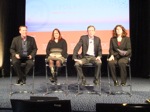 Sarah Weinman (Publishers Marketplace), Kelly Gallagher (RR Bowker), Peter Hildick-Smith (Codex-Group LLC), Jennifer Manning (Nielsen)
Sarah Weinman (Publishers Marketplace), Kelly Gallagher (RR Bowker), Peter Hildick-Smith (Codex-Group LLC), Jennifer Manning (Nielsen)
Weinman: talk about the story behind the story of surveys.
Manning: look at digital devices as a whole in terms of mobile devices. Most of people own more than one mobile device – most own 3. iPad users tend to be more accepting of advertising than Android users. Don’t see any major disruptions coming up.
Hildick-Smith: doing book audience research since 2004 and looking at digital since 2007. Large sample, quantitative online research. Since books cover all of human experience it is difficult to get a representative sample and so large participant groups are important. On ereaders, last major study done last November. Looking a very high interest in readers. Forecast 4.4 million kindles sold. What happened over holidays is a lot of people pulled back from iPad interest as book buyers. Kindles lived up tu expectations. Half of kindle owners read more print than digital, among iPad owners 66% read more print than digital. Consumers still in a major state of flux. Focus groups are not a good way to get good answers, but lead to finding good questions. 120 million US adults read a book in the last year, but the power buyer group is most important. If doing concentrate on internet will under represent 65 and over and over represent women. Market changing so fast that don’t feel comfortable forecasting out any farther than 12 months. Even 6 months out can be a risky business to try to forecast. Biggest disruption coming up: only 3% of book discovery comes from the internet and 30% comes from bookstores that this is going to change a lot if Borders goes under. Tablet not stepping up to the book reader side as much as expected. Is more a general purpose device.
Gallagher: tend to be a headline driven industry and some of research follows that approach. Trying to create an ongoing, trendable study that can be looked at over time. Need to understand who is emerging as the ebook power buyer in the marketplace. In print book world 18% of buyers make up 48% of sales and it seems that in digital the 18% makes up about 68% of ebook sales. Need research that will be a predictor for the future. Haven’t been good historically in the industry in looking at the research as opposed to anecdotal information. Sometimes overlook the qualitative research, which can be a great help or predictor as to where the quantitative will end up. Young adults moving towards digital books at a much slower pace then was expected – cite “digital fatigue”. As an industry it’s OK to continue to make headlines, but maybe we should stop reading them! Forecasting out a year is probably a safe bet.
































Young adults moving towards digital books at a much slower pace then was expected – cite “digital fatigue”
YA are moving to digital slower because if they don’t have credit cards, they can’t buy books. They need adult supervision to buy ebooks online; the number of parents who’ll give their kids a Kindle with free access to purchase books is small. Amazon doesn’t have a “child account” option where adults can give them a set amount of money & they can buy their own books; neither does anyone else.
Let’s not confuse surveys with facts. Companies that rely on surveys tend to finish last.
Teleread has had a bunch of these forum transcription deals. I think they would be a lot easier to read if I knew WHY they lacked so much grammar: lack of subjects, articles, tense in some cases. What is the deal? This can’t possibly be what these people are actually saying.